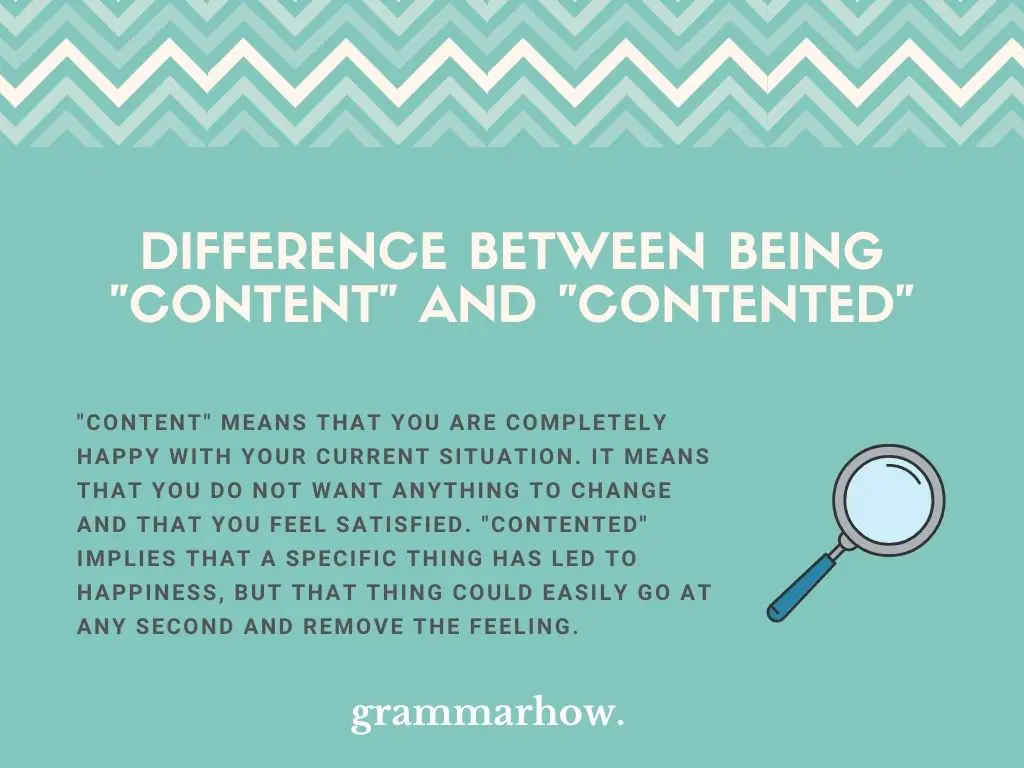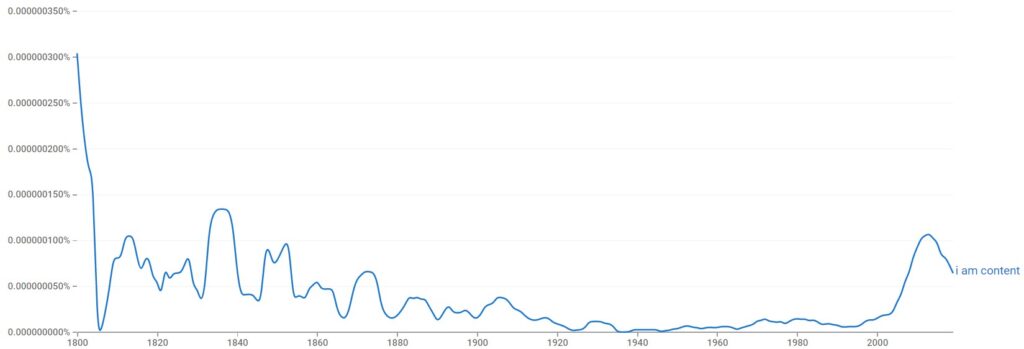Both “content” and “contented” are correct. However, we need to know what the meanings of both are and where the differences lie. This article will explain everything you need to know about the two forms.
What Is The Difference Between Being “Content” And “Contented”?
“Content” means that you are completely happy with your current situation. It means that you do not want anything to change and that you feel satisfied. “Contented” implies that a specific thing has led to happiness, but that thing could easily go at any second and remove the feeling.

Both words are recognized as verbs and adjectives. We can use them both to talk about satisfaction in some regard, but that doesn’t mean they’re synonymous.
Are “Content” And “Contented” Interchangeable?
It’s not common for people to use “content” and “contented” in the same way. While they clearly both come from the same root word (since they have similar definitions), that doesn’t mean they’re interchangeable.
“Content” is a general term we use to show our satisfaction with life. It means nothing needs to change in our eyes to remain happy. “Contented” implies that something made us feel satisfied, but that feeling is often shorter-lived.
Therefore, the two words are not synonymous. You will be better off using “content” in most cases when you want to show your true satisfaction toward something.
What Does It Mean To Be “Content”?
“Content” means that you are completely satisfied and happy. Usually, things in your life have happened in such a way that you feel truly grateful for what you have. You don’t believe that anything else could come along that would make you feel any better.
The definition of “content,” according to The Cambridge Dictionary, is “pleased with your situation and not hoping for change or improvement.”
We can use it as a verb or an adjective, and it would help to know more about both forms.
Adjective
- I am content with all the amazing things I have in my life right now.
- You should be content! You’ve got so much good in your life!
- I love being this content! It makes me feel like I’m on top of the world!
“Content” works well as an adjective form. We can use it to describe our current sense of satisfaction or happiness. It would take a lot for something to ruin our “content” feeling.
Verb
- You content me with your kind words.
- I will content her to make sure she understands how special she is.
- If you could content me with words, I’d be the happiest girl alive.
“Content” is a present tense verb form, so we use it to show that we intend to make someone feel happy or satisfied in the present. This also applies to future situations (using “will content” is a future-tense form).
What Does It Mean To Be “Contented”?
“Contented” works better to talk about something giving us a feeling of contentment. However, this thing can easily be taken away, so it’s not common for the feeling to last once that’s gone. There are plenty of things that would make some happier.
The definition of “contented,” according to The Cambridge Dictionary, is “happy and satisfied.”
“Content” people usually have everything they could want, while “contented” people usually would like more, but they’re currently thankful and satisfied with everything.
Again, though, we can use both verb and adjective forms for “contented.”
Adjective
- I am contented with the things around me, but I always want more.
- You look so contented lately! What is it that’s made you feel that way?
- Her contented smile looked a little forced to me.
As an adjective, “contented” shows that someone feels happy and satisfied. However, it usually relates to something more specific that might have caused a current sensation of happiness rather than one that will last.
Verb
- I contented her when I needed to, but that time has passed.
- You were contented by her charm, but you shouldn’t have been so quick to trust her.
- I didn’t think that I was contented by her, but now I know that I miss her dearly.
“Contented” is the past-tense form of “content.” We use it to show that we were previously happy and satisfied, but the feeling has since passed (hence why it’s the past-tense form).
Is It “I Am Content” Or “I Am Contented”?
“I am content” is the only acceptable phrase we can use. We use “content” in this way as an adjective to show that we have everything we want. “I am contented” does not work because “contented” is mainly the past tense of the verb “content.”
According to Google Ngram Viewer, “I am content” is the only acceptable choice of the two. This shows that “I am contented” should never be used.

Instead, you might find “I was contented” to be more helpful. “Contented” is a past tense phrase, so “was” suits it better.
What Is The Difference Between “Content” And “Contentment”?
“Content” is an adjective to describe a feeling or a verb to show the action of making someone happy. “Contentment” is a noun, which we attribute to the feeling of “contentment” that we might get instead of describing ourselves as “content.”
The following example should show you how the noun form works to talk about the content feeling:
- The contentment that I feel is beyond measure!
What Is The Past Tense Of “Content”?
“Contented” is the past tense of “content.” Remember, when we use it as a verb, it’s appropriate to use “contented” when we are showing that we made someone happy or satisfied in the past, but we might not be doing the same thing now.
- Present tense: She contents me every day that she’s near.
- Past tense: I contented him for as long as I could, but I can’t keep it up anymore.
What Is The Difference Between Being “Content” And Being “Satisfied”?
“Content” works best to talk about the feeling of happiness you get even if a goal is not achieved. You might not have planned to feel “content.” “Satisfied” works when a goal is achieved, and it’s the feeling of happiness or accomplishment you get from completing the goal.
You may also like: Content vs. Contents – Difference Explained (With Examples)

Martin holds a Master’s degree in Finance and International Business. He has six years of experience in professional communication with clients, executives, and colleagues. Furthermore, he has teaching experience from Aarhus University. Martin has been featured as an expert in communication and teaching on Forbes and Shopify. Read more about Martin here.

